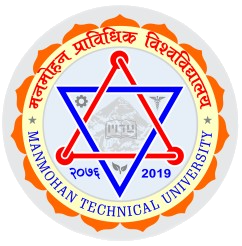- Emailinfo.som@mtu.edu.np
- Contact+977 021-590663
Bachelor of Pharmacy
PROGRAM OVERVIEW
The Bachelor of Pharmacy (B. Pharm.) curriculum at the Manmohan Technical University (MTU) has
been guided by the principles that the pharmacists should be the vital members of the integrated
health care team. The students after their graduation will assume leadership and managerial roles in
government or private sector in various areas such as community pharmacy, clinical pharmacy,
hospital pharmacy, herbal drug technology, pharmaceutical industry, regulatory affairs, quality
assurance, academia, veterinary pharmacy, health care waste management, drug and poison
information and pharmacovigilance, training and research, pharmaceutical marketing, health
journalism, pharmacy informatics, pharmaceutical supply chain management and other.
PROGRAM GOALS
The goal of the curriculum is to produce qualified pharmacists who would provide pharmaceutical
services, research and education in the capacity of:
Community and hospital pharmacists
Clinical Pharmacy and therapeutics managers and advisers
Herbal drug development technologists
Pharmaceutical marketers and pharmaceutical supply chain managers
Pharmacy informaticians
Health journalists
Managers in the pharmaceutical industries and community pharmacies
Naturopathy counselors
Veterinary pharmacists
Drug and poison information and pharamacovigilance practitioners
PROGRAM OBJECTIVES
The curriculum has following objectives to:
Maintain professionalism, ethics and code of conduct.
Liaise with different healthcare professionals and stakeholders including fellow
pharmacists.
Contribute as the integral member of the multidisciplinary health care team.
Translate the pharmacy-related skill and knowledge into practice areas.
Appraise critically the national legislation on drug and related fields, National Health Policy
and other pharmacy-related regulations.
Assume leadership in the collaborative research projects.
Demonstrate competence in extracting, handling and integrating health-related information
and apply the knowledge, skills and attitudes in the professional problem solving.
Course Contents:
First Semester
- Anatomy and Physiology-I
- Pathophysiology-I
- Pharmaceutical Chemistry-I (Inorganic Chemistry)
- Pharmaceutical Microbiology and Immunology
- Pharmaceutical Biochemistry
- Mathematics for Pharmacy
- Fundamental of Pharmacy
Second Semester
- Anatomy and Physiology-II
- Pathophysiology-II
- Pharmaceutical Chemistry-II (Organic Chemistry I)
- Pharmaceutics-I (Physical Pharmacy)
- Pharmacognosy
- Pharmaceutical Biotechnology and Pharmacogenetics
Third Semester
- Pharmaceutical Engineering I
- Pharmacology-I
- Pharmaceutical Chemistry-III (Organic Chemistry II)
- Pharmaceutical Analysis-I
- Biopharmaceutics and Pharmacokinetics
- Traditional System of Medicine
Fourth Semester
- Pharmaceutical Engineering II
- Pharmacology-II
- Quality Assurance and Instrumental Analysis
- Pharmaceutical Analysis-II
- Medicinal Chemistry-I
- Health System Pharmacy
- Health Information Management System in Pharmacy
Fifth Semester
- Pharmaceutics-II(Dosage form Design & Formulation)
- Pharmacology-III
- Pharmacotherapeutics- I
- Pharmaceutical Management and Entrepreneurship
- Medicinal Chemistry-II
- Pharmaceutical Seminar-I
- Elective -I
Sixth Semester
- Pharmaceutics-III (Industrial Pharmacy)
- Pharmacy Practice
- Pharmacotherapeutics-II
- Pharmaceutical Biostatistics and Research Methodology
- Pharmaceutical Marketing
- Pharmaceutical Seminar- II
- Elective- II
Seventh Semester
- Clinical and Hospital Pharmacy
- Community Pharmacy and First Aid
- Herbal Drug Technology
- Pharmaceutical Jurisprudence
- Toxicology
- Elective -III
- Proposal Presentation (Literature Review)
Eighth Semester
- Project Work
- Work Based Education: (8 weeks /2 week)
a. Clinical and Hospital Pharmacy
b. Community Pharmacy and First Aid
c. Industrial Pharmacy
d. Pharmaceutical Marketing

